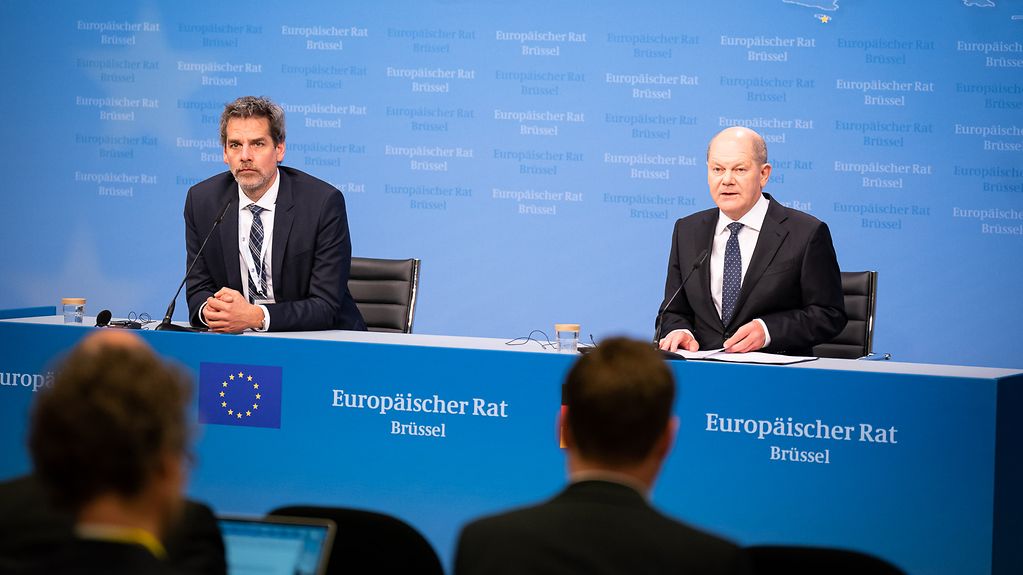European Council meeting in Brussels
EU leaders have achieved some important results at the European Council meeting including a further 18 billion euros for Ukraine, the ninth sanctions package against Russia, renewed momentum for the EU enlargement process, and a minimum global tax for large corporations.

"These are good results," said Scholz, summing up this EU meeting.
Photo: Federal Government/Kugler
Federal Chancellor Olaf Scholz rated the European Council meeting in Brussels in a positive light. "In the same spirit, I am extremely confident that we will also agree on far-reaching steps in the energy sector on Monday."
Additional aid for Ukraine
The focus of the deliberations was the Russian offensive against Ukraine. Federal Chancellor Scholz emphasised the fact that the EU Member States have stood by Ukraine right from the start. "Our mutual determination to support Ukraine politically, with humanitarian aid, financially, and also with armaments for as long as necessary remains unbroken," said Scholz. This, he added, was especially important in winter, when "Russia’s perfidious strategy" had been to destroy the Ukrainian infrastructure.
The EU, he continued, had now agreed to provide 18 billion euros in financial aid, which would be used to secure public expenditure in Ukraine during the coming year. A further two billion euros would also be provided to enable European arms deliveries to Ukraine.
The Federal Chancellor also welcomed the agreement on the ninth sanctions package, stating that "the ninth sanctions package will further increase the pressure on the Russian leadership.”
The outcome of the European Council meeting of 15 December 2022 is set out in the conclusions document.
Concluding agreement at the Energy Council meeting on Monday
But the Russian offensive also has ramifications for Europe, especially in the energy sector, which, as the Federal Chancellor said, means that we need to find a way "to reduce the high energy prices without endangering supply security or financial stability". Significant progress had already been made in this direction, he said. The European Council has instructed the energy ministers to conclude the final agreement next Monday when the Federal Chancellor is "extremely confident that a final agreement will be concluded."
The energy ministers will also be taking other important decisions on Monday regarding joint gas purchases, emergency solidarity mechanisms, and the urgently needed acceleration of the expansion of renewable energies and energy grids.
Stepping up talks with the USA
The European Council also addressed the question of how to keep the economy competitive and innovative, whereby the main focus was on the USA’s climate programme and the associated subsidies. The Federal Chancellor stressed the EU's explicit support for making progress on climate protection targets but said that this should not put European companies at a disadvantage.
That, he said, was why he had advocated stepping up talks with the USA. "What’s more," he added, "I’m quite confident that we will be able to improve the situation through dialogue with our American partners.”
At the same time, he said, the EU could already take some important steps in the right direction: for example, it would be possible to simplify the law on state aid or expedite approvals for projects of common European interest.
Corruption within the European Parliament
The customary discussion with European Parliament President, Roberta Metsola, was mainly concerned with the European Parliament's corruption scandal. Federal Chancellor Scholz said that he considered this to be "an extremely serious matter that could shake confidence in democracy and parliamentarianism.” Therefore, he said, it was good that the Belgian authorities were investigating the case thoroughly and shedding more light on it. He also said that he trusted the President to implement the measures she had presented in the fight against corruption.
A project close to the Federal Chancellor's heart
As the press conference drew to a close, the Federal Chancellor returned to two topics that are particularly important to him, namely the EU enlargement process and a minimum global tax for large corporations.
The heads of state and government, he said, had explicitly welcomed Bosnia-Herzegovina's achievement of EU candidate status. However, Scholz continued, it was also clear that "Bosnia-Herzegovina still has to implement substantial reforms before concrete negotiations can begin.”
The Federal Chancellor was also "very pleased that we managed to enshrine a minimum global tax for large corporations in binding European law today." The Federal Chancellor had already championed this "project close to his heart" when he was still Finance Minister. Almost 140 countries agreed on a globally uniform minimum tax rate for large corporations of at least 15 per cent in October 2021, which is intended to ensure more tax justice throughout the world. "I would therefore ask you to indulge me in a rare moment of self-satisfaction," said Scholz.